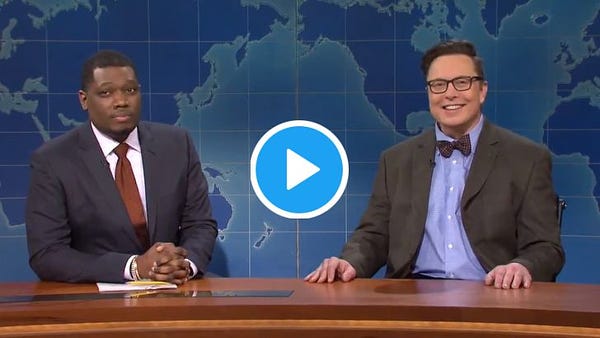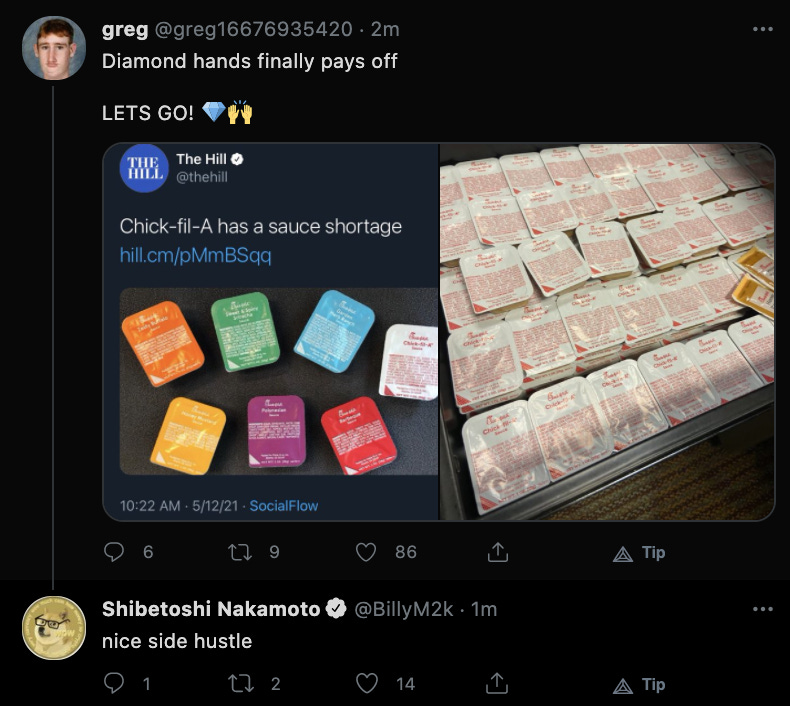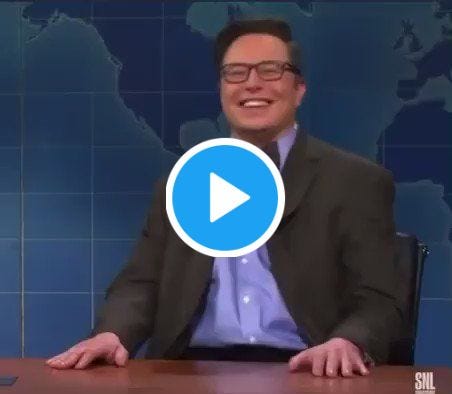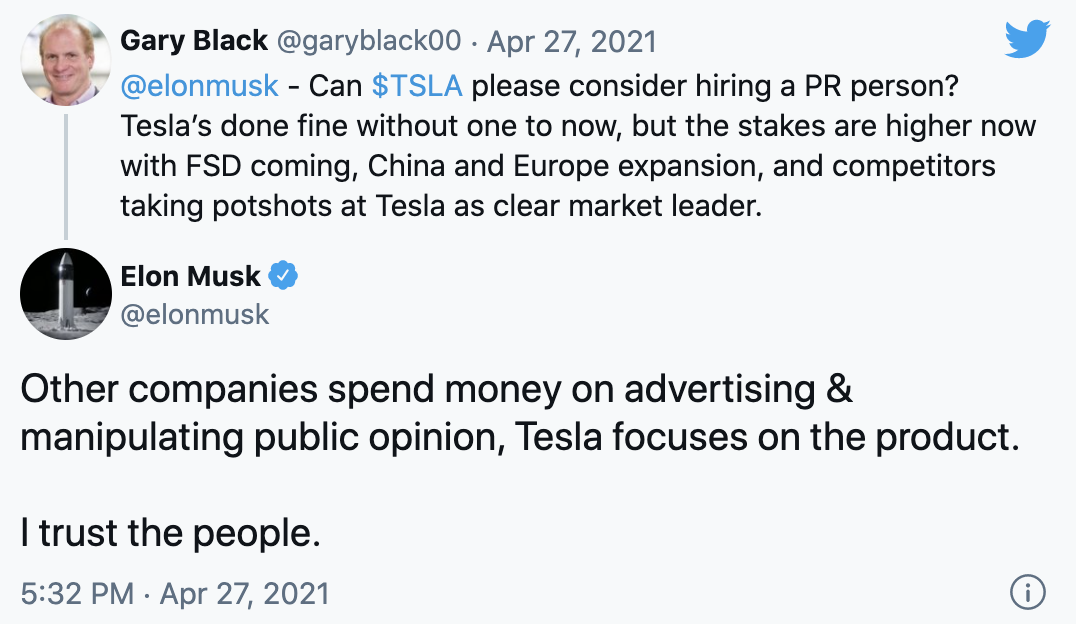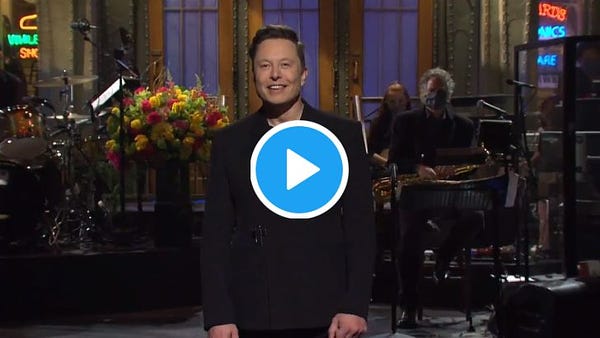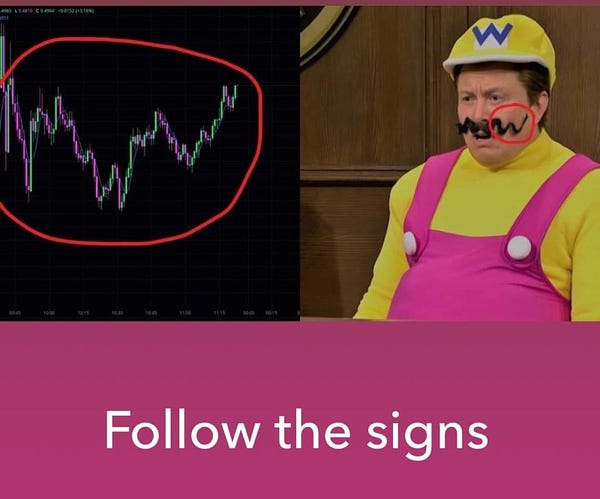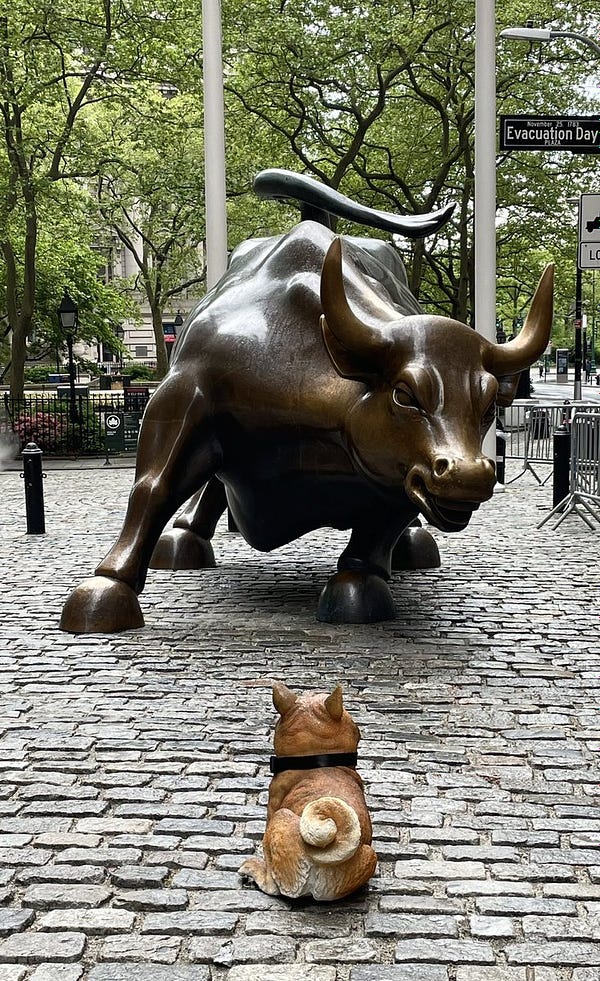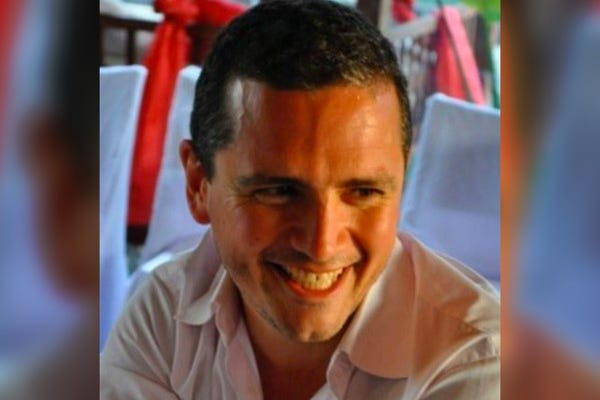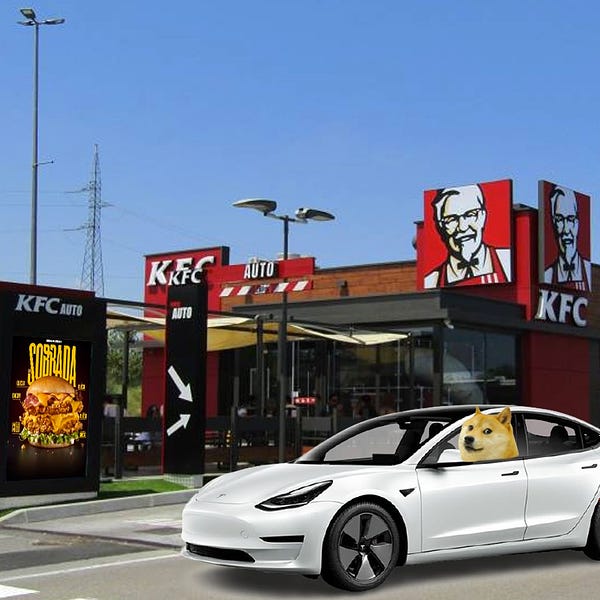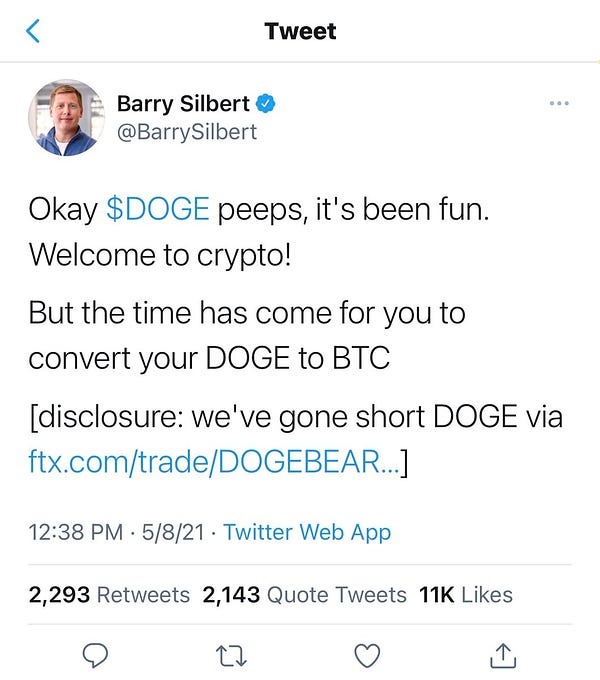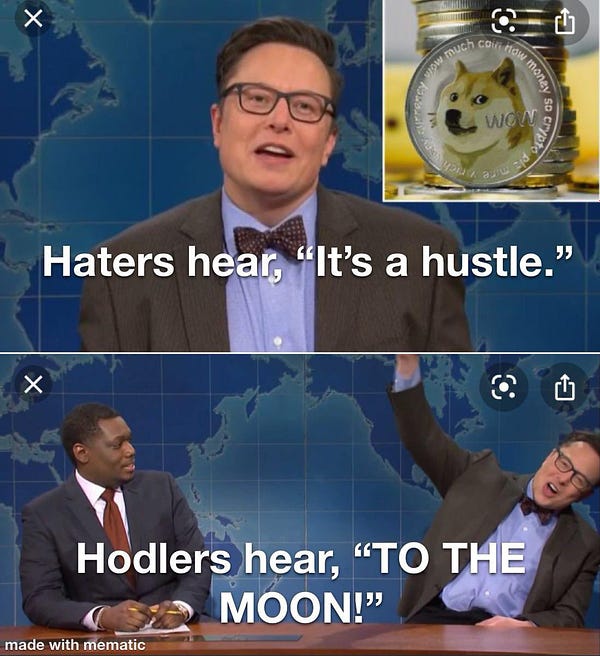Musk and the meaning of hustle
After last Saturday night’s Elon-hosted SNL episode saw a steep correction in Dogecoin’s price, news outlets were quick to pen obituaries. Most seized upon Musk alter-ego Lloyd Ostertag’s explanation of Doge as “a hustle,” uncritically interpreting hustle to mean “scam.”
How viewers themselves heard this punchline depended, in part, on their background. Younger, internet-native generations have lived much of their lives amid a financial backdrop of crushing college debt, rising prices, flat or declining wages, and jaw-dropping inequality. For these viewers, the inherent scamminess of the global economic system is obvious to the point of being mundane. They’re more likely to interpret “hustle” it to mean, simply, “work,” as in “it’s one of my side-hustles,” connoting the scrappy resourcefulness required to stay afloat in an economy built to benefit someone else.

It remains an open question what kind of hustle Dogecoin will be. Is it, like the 2008 housing crisis, the kind of scam that siphons money from regular people and redistributes it to the already-wealthy? That seems to be the filter through which Musk’s utterances are interpreted by the media. In this scenario, Musk would use Dogecoin to “rug pull” other smaller investors by dumping his large stock of the currency on the unsuspecting market, causing the price to tank while he makes off with piles of cash.
Although it seems like the media is constantly encouraging us to expect the worst from Musk and Doge, this negative outcome would actually be a break from recent events. Over the last several months, Musk has publicly sided with retail investors while being critical of hedge funds and the power structures which enable them (especially the SEC). In particular, he’s derided the practice of institutional shorting, used by hedge funds to scare retail investors into selling their assets at a discount:

On Tuesday, Musk hinted at a different possibility, in which Dogecoin represented a hustle not by financial elites against regular people but by regular people against elites:
Most outlets that chose to focus on the “hustle” punchline missed several hints from Musk suggesting his sincere belief that Dogecoin is the opposite of an ephemeral ponzi. He opened the segment by telling Michael Che, “Call me the Dogefather.” Later, he explained that Dogecoin was “the future of currency. It’s an unstoppable financial vehicle that’s going to take over the world.” He closed the skit with the crypto rallying cry, “to the moooon!”
While the media continues to depict Musk as a cross between a Bond-villain and confidence man, an alternate reality has started to trickle through to the broader public. Speaking directly to his followers, Musk has framed Dogecoin as his own personal stimulus scheme, available to anyone who wants a piece of the action (Musk is widely understood to be Doge’s largest holder). If running his own private dog-themed UBI weren’t accomplishment enough, somewhat miraculously, he has brought electric vehicle industry back from the dead to the cusp of widespread adoption at the same time that he’s revitalized US space ambitions, two accomplishments which put the media’s reflexive stream of Musk-directed scorn and doubt appear small-minded.

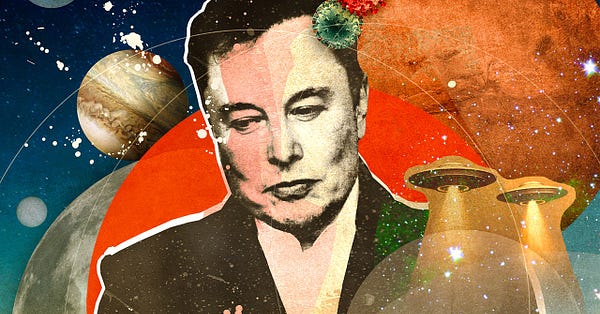
The structure of Musk’s companies reflect his approach toward the media’s publicity-industrial complex. Tesla doesn’t advertise and lacks a PR department, instead relying on word of mouth.
With declining subscriber revenues, legacy media is increasingly supported by advertising. It’s a model that has accelerated in recent years even as questions are raised about whether and how much outlets are beholden to the corporations buying the ads—does he who pays the piper call the tune apply to NYT and WaPo too? The fact that Musk steadfastly refuses to participate in this system on its own terms should be weighed whenever he receives a negative appraisal from the mainstream.
Hosting SNL may have been a turning point in the battle over how Musk is perceived by the public. His humanity was nowhere more apparent than the opening monologue, in which he publicly acknowledged he has Asperger’s syndrome for the first time and invited his mom on stage to wish her happy Mother’s Day.
It also came through in his sense of humor. Of all the skits, his portrayal as Mario doppelgänger Wario—whom, fittingly, he sought to depict as simply misunderstood rather than evil—got the best reviews, including from Musk himself.
Musk often tweets in cryptic riddles and images. Predictably, everything he said or did on the show was dissected by his millions of fans for clues about the future of Dogecoin:
When the dust settled on Sunday morning, real important news about Dogecoin began to break. It had nothing to do with Doge’s temporary dip in price. The big announcement was that SpaceX had planned its first mission funded fully with Dogecoin: the Doge-1 satellite.

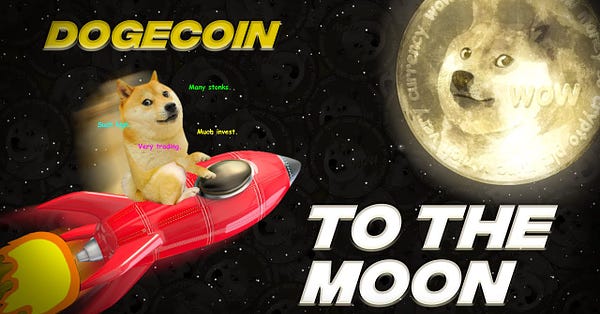

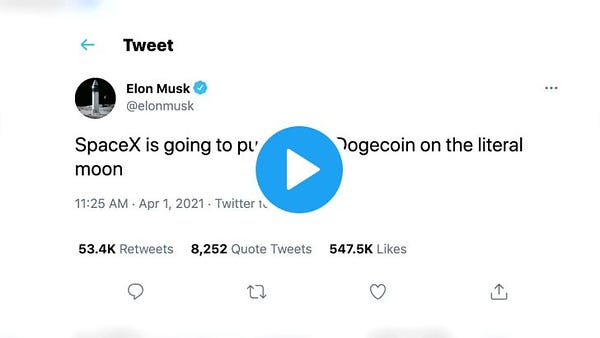
Yes, Doge is a hustle. It’s up to you to decide what kind.



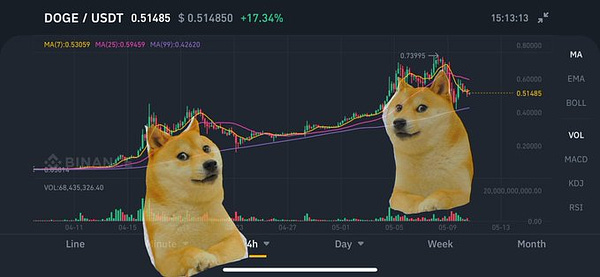
Update: twitter user @ben20five has pointed out to me that Lloyd Ostertag is an anagram for “Stay Doge, Troll!” which feels relevant in some way.





